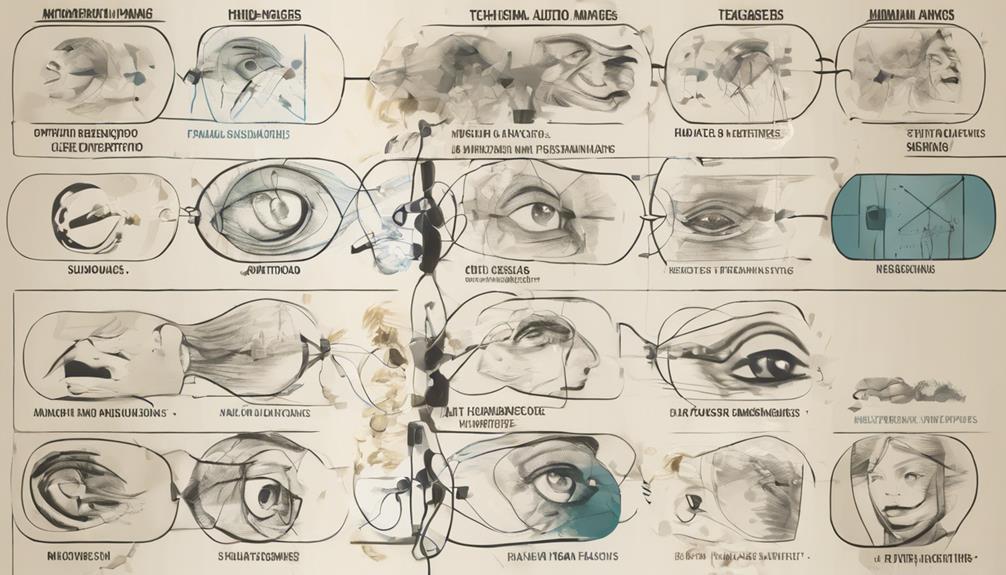Discover how subliminal messaging has progressed in shaping behavior modification. Early concepts influenced by Freud led to examining preconscious perception and hidden stimuli impacts on the mind. From advertising to therapy, it's been used to influence consumer choices and heal negative thought patterns. In learning and sports, it enhances outcomes by targeting the subconscious for suggestions. Stress reduction benefits from cognitive restructuring and positive affirmations. Dive deeper into how this subtle power evolves to shape behaviors positively.
Early Concepts of Subliminal Messaging
Explore the origins of early concepts surrounding subliminal messaging, tracing back to the early 20th century when researchers first began to delve into its potential impact on human behavior.
Freud's influence played a significant role in shaping these early ideas, as psychologists began to study hidden stimuli that could influence individuals without their conscious awareness.
One key aspect that emerged from these early studies was the notion of preconscious perception. Researchers hypothesized that individuals could perceive and process information without being consciously aware of it, leading to potential effects on their thoughts and behaviors.
Through experiments and observations, scientists started to uncover the complexities of how hidden stimuli could affect the human mind.
These early investigations laid the groundwork for future research into subliminal messaging and its implications for behavior modification.
Subliminal Messaging in Advertising
Early concepts of subliminal messaging paved the way for its application in advertising, where subtle cues are strategically embedded to influence consumer behavior without their conscious awareness. In advertising, subliminal messaging is utilized to sway consumer decisions without them realizing it. This technique can be seen in political campaigns where hidden messages are inserted to influence voters' perceptions subtly. However, ethical concerns arise regarding the manipulation of individuals without their explicit consent.
Moreover, subliminal messaging in music has been studied for its ability to subconsciously influence listeners. Lyrics or sounds played at a barely perceptible level can impact emotions and choices without the listener being fully aware. This subtle technique has raised questions about the extent of its influence on individuals' preferences.
In the realm of advertising, subliminal messaging continues to be a controversial tool, with ongoing debates about its effectiveness and ethical implications. It remains a powerful strategy for marketers looking to shape consumer behavior through subtle, yet impactful, cues.
Subliminal Techniques in Therapy
Subliminal techniques in therapy can subtly influence subconscious thoughts and behaviors to facilitate positive outcomes in individuals undergoing treatment. These techniques, often referred to as subliminal healing, have found therapeutic applications in various fields such as psychology and counseling.
By utilizing subliminal messages or stimuli that are below the threshold of conscious awareness, therapists can target deep-seated issues and help individuals overcome challenges.
In therapy, subliminal techniques are used to reprogram negative thought patterns, boost self-esteem, alleviate anxiety, and promote overall well-being. Through subtle cues like visual images, sounds, or even scents, therapists aim to bypass conscious resistance and directly impact the subconscious mind. This can lead to profound changes in behavior and attitudes over time.
Impact on Behavior Modification
The impact of subliminal messaging on behavior modification can be significant and far-reaching, influencing subtle changes in individuals' actions and decisions. In education, subliminal messaging has been explored as a tool to enhance learning outcomes. By incorporating positive affirmations or key information into educational materials at a subconscious level, students may experience improved retention and comprehension of the material.
Similarly, in the realm of sports performance, subliminal messaging has been utilized to boost athletes' confidence and focus. Messages promoting perseverance or peak performance flashed rapidly during training sessions or competitions can help athletes maintain a winning mindset and push through mental barriers.
These applications of subliminal messaging showcase its potential to shape behavior and performance in various domains. By tapping into the subconscious mind, subtle suggestions can lead to tangible improvements in learning, skill acquisition, and mental resilience.
As research in this field continues to evolve, the impact of subliminal messaging on behavior modification is poised to become even more nuanced and effective.
Subliminal Messaging for Stress Reduction
Using subliminal messaging techniques can assist in reducing stress levels effectively. The mind-body connection plays a crucial role in how we experience stress, making it essential to address both mental and physical aspects.
By incorporating relaxation techniques into subliminal messages, such as guided imagery or progressive muscle relaxation, you can help your mind and body unwind and release tension.
Cognitive restructuring through subliminal messaging can also be a powerful tool in stress reduction. By embedding positive affirmations in subliminal messages, you can reframe negative thought patterns and cultivate a more optimistic outlook.
These affirmations can help counteract stress-inducing beliefs and promote a sense of calm and well-being. Subliminal messaging for stress reduction works by subtly influencing your subconscious mind, encouraging it to adopt healthier coping mechanisms and responses to stressors.
Through consistent exposure to these positive messages, you can gradually rewire your brain to handle stress more effectively and foster a greater sense of inner peace.
Enhancing Confidence Through Subliminal Messages
To boost your self-assurance and belief in yourself, consider incorporating subliminal messages aimed at enhancing confidence into your daily routine. Self-esteem boosting messages can have a powerful impact on your subconscious empowerment. By consistently exposing yourself to positive affirmations such as 'I am confident and capable' or 'I believe in my abilities,' you can gradually rewire your thoughts and beliefs about yourself.
These subliminal messages work beneath the surface of your conscious awareness, influencing your mindset and behavior in subtle yet profound ways.
As you continue to immerse yourself in these confidence-enhancing cues, you may start to notice a shift in how you perceive yourself and approach challenges.
Future Trends in Subliminal Hypnosis
Get ready to explore the upcoming advancements in subliminal hypnosis techniques. As technology continues to advance, the future of subliminal hypnosis holds exciting possibilities for subconscious programming.
Here are some key trends to look out for:
- Neurofeedback Integration: Utilizing futuristic technologies to provide real-time feedback on brain activity during hypnosis sessions.
- Virtual Reality Immersion: Creating immersive virtual environments to enhance the effectiveness of subliminal messaging.
- Biofeedback Devices: Incorporating wearable devices that monitor physiological responses to tailor subliminal messages accordingly.
- AI Personalization: Implementing artificial intelligence to analyze individual responses and customize subliminal programming.
- Ethical Considerations: Addressing the ethical implications of subliminal influence and ensuring responsible use of these techniques.
The future of subliminal hypnosis is poised to revolutionize the way we understand and harness the power of the subconscious mind, paving the way for innovative approaches to personal development and behavioral modification.
Conclusion
In conclusion, subliminal messaging has come a long way in the realm of behavioral modification. From its early concepts to its widespread use in advertising and therapy, the impact on shaping behavior is undeniable.
With innovative techniques for stress reduction and confidence building, the future of subliminal hypnosis holds endless possibilities. It's as if subliminal messaging has the power to transform minds with the flick of a switch.
Dr. John Renoldson is a distinguished professor of Clinical Research Hypnotherapy He holds a PhD in Clinical Psychology and specializes in hypnotherapy and scientific research to enhance therapeutic outcomes. Dr. Renoldson has authored numerous peer-reviewed articles on the efficacy of hypnosis in treating conditions.




